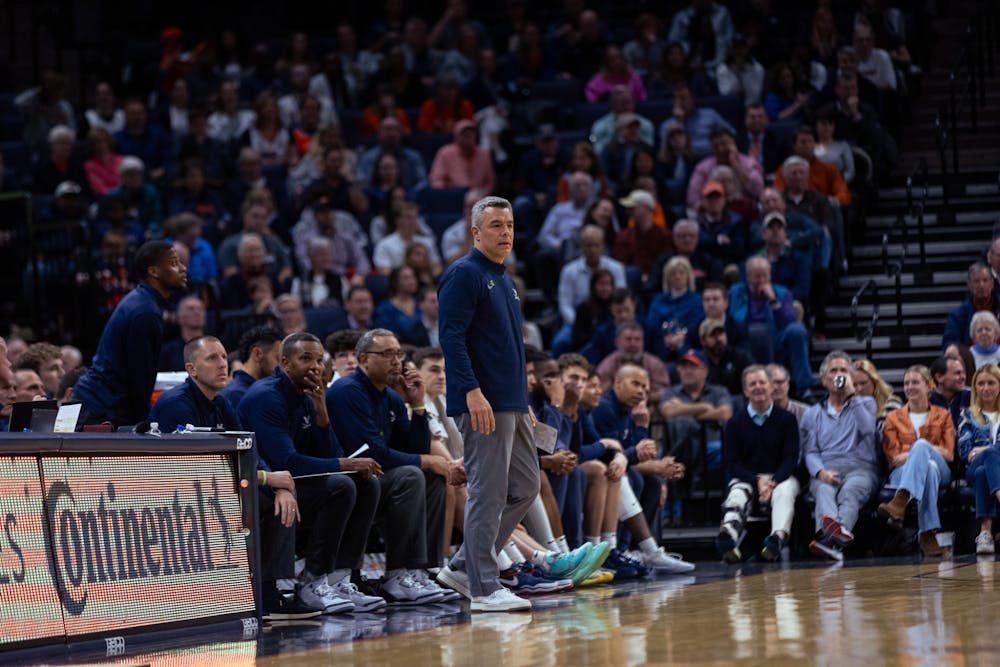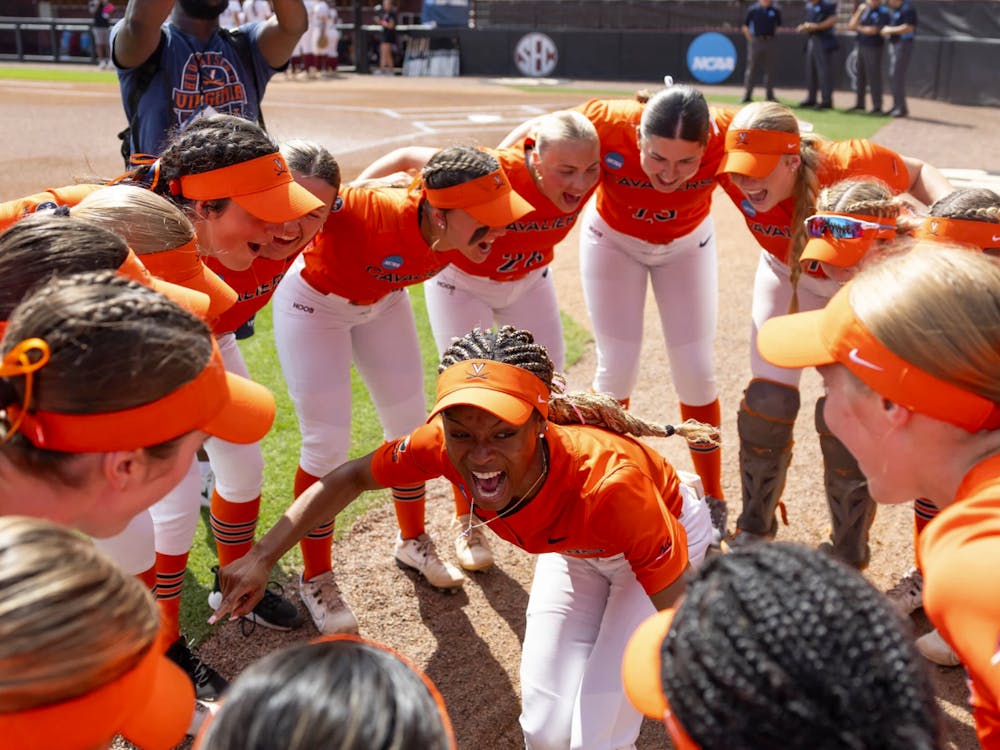Virginia men’s basketball lost by 25 points March 19 against Colorado State in the First Four of the NCAA Tournament. The Cavaliers bowed out to No. 13 seed Furman in the opening round a season prior, missed the tournament entirely in 2022 and and fell to No. 13 seed Ohio in the first round in 2021. The program hasn’t won a game in the “Big Dance” since its national title run in 2019, leaving questions surrounding Coach Tony Bennett’s future in Charlottesville.
Bennett is the greatest coach in Virginia men’s basketball history and will be lauded in Charlottesville lore long after he and the Cavaliers part ways. However, puzzling game management, peculiar personnel decisions, acute struggles to recruit and underwhelming results in the team’s biggest games for the last half-decade will have clouded a few of his past accomplishments in the eyes of some Cavalier fans. Virginia men’s basketball has an important decision to make, and for the first time in his tenure, it is about Bennett.
The case for keeping Bennett
Virginia basketball is at a distinct recruiting disadvantage compared to other power conference schools. Throughout the program’s history, Virginia has had elevated academic standards for student-athletes. The athletics department requires higher rates of degree progress per year than NCAA minimums, focuses more on Olympic sports than other schools — with women's swim and dive being the primary beneficiary — and significantly lacks NIL funding in the power conference marketplace. This reality would be a death sentence to another program.
Despite these disadvantages, Bennett has consistently recruited above the program’s historic average — Virginia has an average recruiting ranking of 40th since his first class in 2010, much better than his predecessors. The fifteenth-year coach has shown a remarkable ability to teach basketball, elevating consistently middle-tier recruiting classes and sending lesser-known recruits like Joe Harris, Malcolm Brogdon, Justin Anderson and others onto successful NBA careers.
Bennett’s system also allows unheralded recruits to shine. By rarely running fast breaks and sticking to blocker-mover offensive sets — a scheme developed by Bennett’s father, Dick Bennett — the team has deprioritized speed, athleticism and isolation scoring in favor of more analytical passing.
This allows Virginia to chase two types of prep players. The first are cerebral players that are undervalued due to limiting physical traits — guard Kihei Clark is a great example of an undersized but intelligent player who thrived in Bennett’s ecosystem. The other type of player are physical specimen with little previous basketball experience, like sophomore guard Ryan Dunn. Dunn was not highly recruited out of high school and nearly had to walk on to the team as a freshman, but elite physical tools, a high motor and Bennett’s teaching turned him into a probable first-round draft pick this season.
Recruiting rankings and tactics aside, there are two facts that make keeping Bennett essential. The first is his track record with the Cavaliers, which is a 364-136 record — 72.8 percent — and a National Championship over 15 years. In the 15 years prior, Virginia went 247-209 and advanced to the NCAA Tournament’s second weekend just once. Bennett has presided over the greatest run in the history of Cavalier basketball, rivaled only by Ralph Sampson’s time on Grounds.
Secondly, no person gets a louder cheer when entering John Paul Jones Arena than Bennett. Not Reece Beekman, not Clark, not Kyle Guy and not even Tristan How on senior night. His popularity drives donations and fan engagement. It has been Bennett’s program, and we’ve all been living in it.
With just two seasons left on his contract, it is worth it to consider shelling out for a medium-term extension — perhaps through 2030 — to keep the decorated coach in Charlottesville until he turns 60. You don’t find coaches like Bennett just anywhere.
The case for moving on from Bennett
Bennett was the perfect college basketball coach for the 2010s, but he may not be ideal as we enter the mid-2020s. Virginia is now a well-established program, but Bennett is holding the program back in some ways. For the first couple of seasons after the National Championship win, it appeared the Cavaliers were simply enduring a less-successful period amid the most achieved one in program history. But with each season that passes, the concern grows.
The offense is in desperate need of a software update — the blocker-mover system has stagnated over the last few years, with the team dropping to 200th in offensive efficiency in KenPom. Too often, the ball moves aimlessly around the perimeter before the team’s lead guard is forced to throw up a runner or pass for a contested jump shot. The most efficient shots in basketball are shots at the rim or behind the three-point line. Virginia took fewer than a third of their shots from each of those zones, instead settling for those low-percentage, low reward mid-range jump shots.
Bennett’s team has also failed to generate or make an acceptable amount of free throws, ranking nearly last in the country in both free throws attempted and free throw percentage. This is an unsustainable approach that Bennett acknowledged needs to change after the First Four loss. Perhaps another coach with a more modern system could elevate Virginia’s current level of talent.
The blocker-mover offense isn’t the only part of the program that seems to be dry-rotting. Bennett has reportedly been unwilling to lead with NIL in recruiting meetings. While this is a moral high road, it is also certainly a turnoff for highly-rated prospects who are having lesser-accomplished basketball programs wave significantly better NIL packages in their faces.
Bennett has also kept his younger players on shorter leashes recently, as most freshmen in the program have been required to redshirt their first year and only slowly build minutes. This lack of immediate playing time is another recruiting turnoff that has the added penalty of pushing players towards the transfer portal. Just this week, freshman guard Leon Bond III, who was efficient but underplayed in the 2023-24 season, announced on his Instagram story that he was leaving the program — more will surely follow.
Finally, Bennett has been hit-or-miss at the increasingly important transfer portal. Virginia’s two least impressive rotation players this season — guards Andrew Rohde and Dante Harris — were both highly anticipated transfers who did not live up to expectations. Each saw their playing minutes slashed as the season progressed.
There’s a wealth of great coaches in the lower levels of high school and college basketball. Many would jump at the chance to take over a talented team with great support and access to the wealth of prep talent in Washington, D.C. Three Final Four coaches — Connecticut’s Dan Hurley, NC State’s Kevin Keatts and Alabama’s Nate Oats — only recently gave up teaching high school and coaching part-time to coach at the Division I level. While the thought may be uncomfortable to some, it could be time to let a younger, hungrier coach take the reins from Bennett and steer the program in a new direction.







